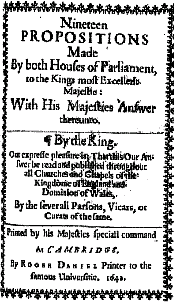Nineteen Propositions facts for kids
The Nineteen Propositions were a list of demands sent to King Charles I of England by the English Parliament on June 1, 1642. At this time, the King was in York. Parliament wanted more power in how the country was run. They asked for things like Parliament being in charge of foreign policy and the army. They also wanted the King's advisors to be answerable to Parliament. King Charles rejected these demands before the end of June. Just two months later, in August, the country fell into the English Civil War.
What Were the Nineteen Propositions?
The Nineteen Propositions started as a polite request to King Charles. Parliament hoped he would agree to their ideas. Here are the main points they wanted:
- 1. Choosing Royal Advisors: Parliament wanted to approve the King's most important advisors, called the Privy Council.
- 2. Public Decisions in Parliament: Important decisions about the country should be discussed and made in Parliament, not by the King's private friends.
- 3. Approving Key Officials: Parliament wanted to approve many top government officials. This included important roles like the Lord Chancellor and the Chief Governor of Ireland.
- 4. Royal Children's Education: Parliament wanted a say in how the King's children were educated.
- 5. Royal Marriages: The King's children should not marry anyone without Parliament's approval.
- 6. Laws Against Catholics: Parliament wanted strict enforcement of laws against Catholics, especially Jesuits and priests.
- 7. Catholic Lords and Education: Catholic Lords should not be allowed to vote in Parliament. Also, children of Catholics should be taught in the Protestant faith.
- 8. Church Changes: Parliament wanted to make changes to how the Church of England was run.
- 9. Control of the Army: King Charles should let Parliament control the militia, which was the non-professional army.
- 10. Returning Members of Parliament: Any Members of Parliament who had been removed from their jobs should be allowed to return.
- 11. Oaths for Officials: Advisors and judges should promise to follow certain laws made by Parliament.
- 12. Job Security for Approved Officials: Judges and other officials approved by Parliament should keep their jobs as long as they behaved well.
- 13. Justice for All: Parliament believed its justice should apply to everyone who broke the law, even if they left the country.
- 14. King's Pardons: The King could grant pardons, but only if both houses of Parliament agreed.
- 15. Commanders of Forts: Parliament wanted to approve the people King Charles chose to lead the country's forts and castles.
- 16. Disbanding the King's Guard: The King's personal military guard, which Parliament saw as unnecessary, should be sent away.
- 17. Alliance with Protestants: England should make a formal alliance with the Protestant United Provinces (the Dutch). This was to defend them against the Pope and his supporters.
- 18. Clearing Accused Members: King Charles needed to clear the names of five members of the House of Commons and Lord Kimbolton. They had been accused of wrongdoing by the King.
- 19. New Lords: Any new members of the House of Lords had to be approved by both houses of Parliament.
Parliament promised that if the King agreed to these demands, they would help him manage his money better. They also said they would make sure he had enough money to live in comfort and honor.
What Happened Next?
The Nineteen Propositions were a very important moment. They showed how much the relationship between the King and Parliament had broken down. It was a turning point from trying to find a peaceful solution to starting a war.
In August 1642, the government officially split. There were two main groups:
- The Cavaliers were loyal to the King.
- The Roundheads supported Parliament.
The Roundheads eventually won the English Civil War. Their leader was Oliver Cromwell. After the war, the idea of a "mixed government" became very popular. This idea, which King Charles had talked about in his reply to the Propositions, suggested that power should be shared between the King, the Lords, and the Commons. This idea of shared power remained important in British politics for a long time.
 | Delilah Pierce |
 | Gordon Parks |
 | Augusta Savage |
 | Charles Ethan Porter |


